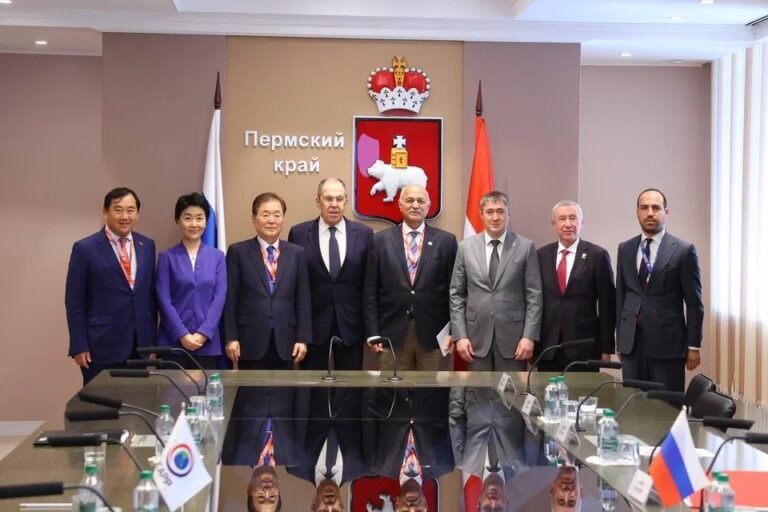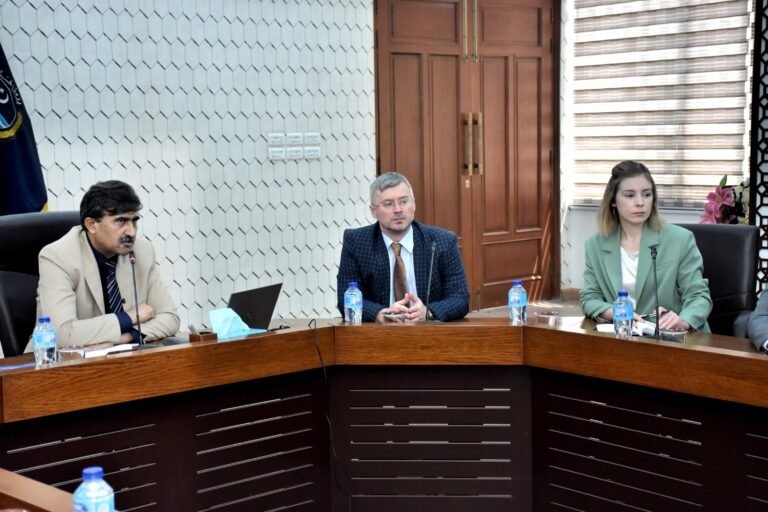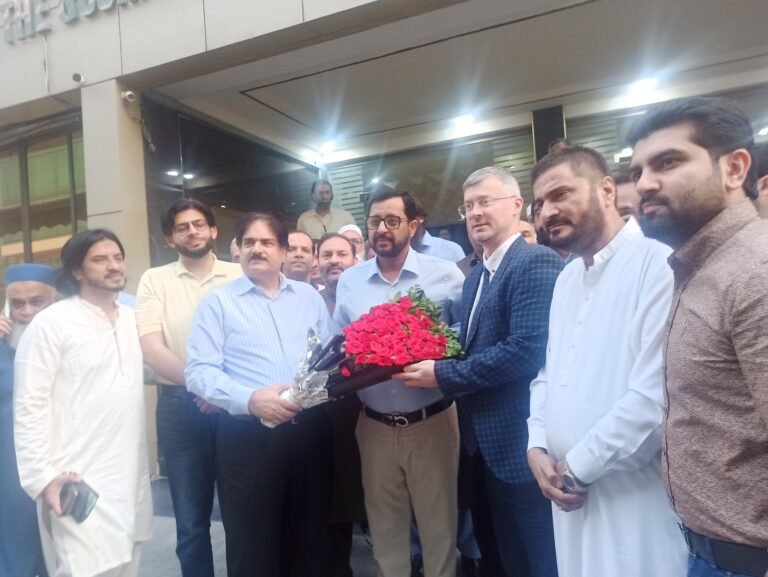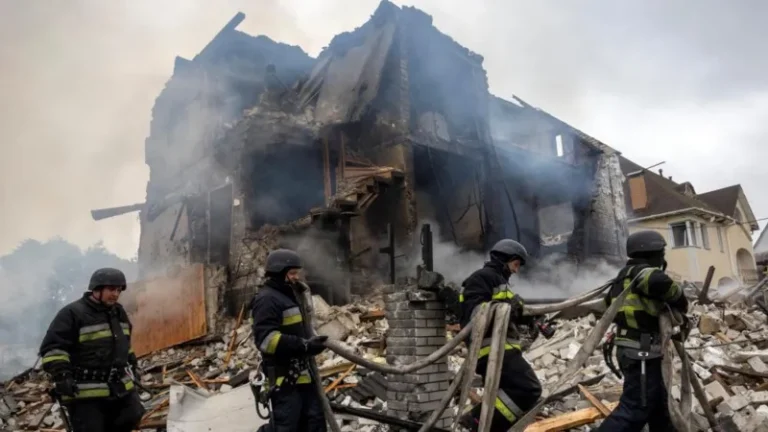The Ambassador of the Russian Federation to Pakistan Albert P. Khorev and Belarusian Ambassador to Pakistan Andrey Metelitsa addressing a media briefing, in which they shared updates on the Eurasian Economic Union and key regional developments regarding Ukraine Conflict.
Briefing on EAEU:
Albert P. Khorev told that the Eurasian Economic Union (EAEU) is an international economic integration organization comprising five member states: Russia, Belarus, Armenia, Kazakhstan, and Kyrgyzstan. Collectively, the EAEU is home to 185,5 million people. The EAEU’s GDP is $2,6 trillion, its industrial production is $1,6 trillion, its agricultural production is $132 billion, and its investments are $487 billion. The EAEU has existed in its current form for over 10 years. Its fundamental document, the Treaty on the Eurasian Economic Union, was signed on May 29, 2014, in Astana, Kazakhstan, by the heads of state of Russia, Belarus, and Kazakhstan. Armenia and Kyrgyzstan joined the Union in 2015. May 29, 2023, was declared the Day of the EAEU.

He says over the past ten years, the EAEU has introduced unified regulations in areas such as creating a common internal market and customs union, technical regulations, tariff and non-tariff regulations, and foreign trade policy. EAEU countries are pursuing coordinated policies in energy, industrial cooperation, agriculture, and digitalization.
The EAEU’s experience has attracted external actors seeking dialogue with our union in various formats. The EAEU has signed free trade agreements with Iran, Serbia, and Vietnam, as well as a non-preferential agreement with China. The Eurasian Economic Commission, the EAEU’s supranational body, has over 80 memorandums of cooperation with third countries, organizations, and integration associations, including the CIS, SCO, ASEAN, and UN structures. Four countries — Iran, Uzbekistan, Cuba, and Moldova — are observer states.
Pakistan’s important geographical location at the crossroads of trade routes makes us optimistic about the great potential for interaction between the Islamic Republic and EAEU countries, particularly with regard to strengthening connectivity and logistical ties.
Ambassador briefed that this year, the Republic of Belarus is presiding over the Eurasian Economic Union.
Russian Ambassador Albert P. Khorev recalled the recent celebration of the 80th anniversary of Victory in the Great Patriotic War, marked by a grand parade on May 9 in Moscow. The parade was attended by 29 foreign leaders, including President of Belarus Alexander Lukashenko and President of China Xi Jinping. The marching column on Red Square included 55 ceremonial units. Military contingents from 13 countries – Azerbaijan, Belarus, Kazakhstan, Kyrgyzstan, Tajikistan, Turkmenistan, Uzbekistan, Vietnam, Egypt, China, Laos, Mongolia, and Myanmar – also took part in the Victory Parade. The mechanised column was led by the legendary T-34 Victory Tank and SU-100 self-propelled artillery units. Missile and artillery units showcased self-propelled artillery systems, Iskander-M precision missile systems, the S-400 Triumf air defence complex, and Yars intercontinental ballistic missile launchers. For the first time, the parade presented unmanned aerial vehicles and loitering munitions, including the Orlan, Lancet, Garpiya and Geran drones. The parade concluded with the renowned Kubinka Diamond formation of Su-30 and MiG-29 fighter jets from the Russkiye Vityazi (Russian Knights) and Strizhi (Swifts) aerobatic teams. Closing the flyover, Su-25 attack aircraft painted the sky in the colors of the Russian national flag.
He also thanked participants of the St. George’s Ribbon campaign during the May 6 reception at the Russian Embassy, which was attended by President Asif Ali Zardari, Senate Chairman Yousuf Raza Gilani, National Assembly Speaker Sardar Ayaz Sadiq, and Khyber Pakhtunkhwa Governor Faisal Karim Kundi. He also thanks to those who participated in the St. George’s Ribbon campaign by wearing the holiday symbol.
Briefing on Ukraine Crisis:
On the Ukrainian crisis, the Ambassador discussed recent diplomatic efforts. A 30-day energy strike moratorium proposed by President Vladimir Putin and supported by President Donald Trump began on March 18.
The Ukrainian side later verbally supported this initiative. This “energy moratorium” has become a kind of “litmus test” to evaluate Kiev’s ability and willingness to implement the ceasefire agreements. The results of the test are disappointing. During the moratorium period, from March 18 to April 17, the Kiev regime violated the agreement about 130 times. Despite Ukraine’s apparent lack of political will to honor the peace agreement, Russia refrained from attacking Ukrainian energy facilities for a month. Additionally, despite Zelensky’s desperate pleas for a ceasefire, Ukraine ignored two more opportunities to demonstrate its commitment to peace. First, Kiev refused to cease hostilities during the Easter truce from April 19-21, violating it a total of 4,900 times, and then rejected President Vladimir Putin’s initiative to suspend hostilities from May 9-11. At the same time, Western media outlets and several Pakistani newspapers are trying to portray Zelensky as a champion of peace by publicising his calls for a 30-day ceasefire. May 19

He questioned the sincerity of Ukraine’s calls for a 30-day ceasefire, arguing such efforts aim to regroup with Western aid.
Ambassador Khorev accused Western leaders of pushing militarization over peace, with Germany notably increasing its defense budget.
Ambassador Albert P Khorev reiterated that sustainable peace requires addressing the conflict’s root causes. He recalled President Putin’s June 2024 peace proposal, which includes withdrawal of Ukrainian forces from new Russian territories, non-NATO alignment by Ukraine, lifting of sanctions, and protection of Russian-speaking citizens.
Russian Ambassador praised the recent Istanbul talks between Russia and Ukraine on May 16, which led to a significant prisoner exchange. The briefing concluded with recognition of the United States’ constructive role, especially President Trump’s efforts in facilitating dialogue. Both sides are now engaged in drafting a potential memorandum for future peace.







